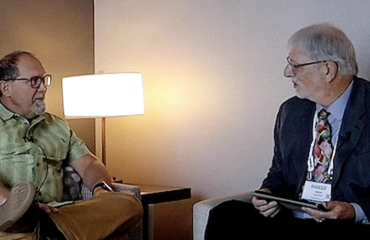By Judge Brian MacKenzie (Ret.) and Judge Harvey Hoffman (Ret.)
Introduction
Prescription opiate and heroin abuse has reached epidemic proportions. Increasing numbers of individuals with prescription opiate and heroin use disorders are finding their way into the Criminal Justice System. Specialty Courts have proven themselves to be an effective response in addressing substance use disorders of offenders participating in their programs and reducing criminal recidivism. However, a major problem for individuals with opiate and heroin use disorders participating in these programs is a lack of supportive housing for recovery that is safe and sober.

They sleep in their vehicles, on the streets, on the couches of a revolving network of friends and in households comprised of others with similar substance use dependencies. It is very difficult for Treatment Court programs to be successful when most of a participant’s time is spent adrift in a subculture where prescription pain killer and heroin use is encouraged and many, if not most of their associates are actively using these drugs.
The obvious answer is to remove these individuals from their ‘using’ environment. A significant percentage of these individuals have long since burned their bridges to their families and have no close connections to the law-abiding world. Placing individuals with prescription opiate and heroin use disorders in jails or prisons over long periods of time is very expensive and not effective. Jails are frequently overcrowded and the public is becoming increasingly disenchanted with the incarceration of nonviolent dependent offenders. Placement of these offenders in residential treatment facilities can be very beneficial, but such placement is also extremely expensive. Residential long-term care runs between $48.00 and $90.00 per day. Residential short-term care runs between $88.33 and $167.00 per day.
The sad reality is that after a few weeks or months, the people with substance use disorders must come out of the jails, prisons or residential treatment programs and all too frequently have no place to go other than the environments from where they came.
An Answer: Permanent Supportive Housing for Recovery
To be successful, Permanent Supportive Housing must include three components: 1) below market rate capital financing; 2) rental subsidies; and 3) on-site social services.
Below Market Rate Financing: The Permanent Supportive Housing for Recovery model is a means of developing safe, long-term housing for identified vulnerable populations, including but not limited to:
- homeless veterans,
- homeless mothers and their children,
- people with physical disabilities and others.

Capital funding for such projects comes from a number of federal programs that are allocated by State Housing Development Authorities. The majority of funding comes from private sector investors who gain a strong rate of return for investing in affordable housing. There are other sources of capital that can be pursued from foundations and the Federal Home Loan Bank of Indianapolis. In addition to low-income tax credits, the upcoming settlements with Walgreens provides a potential opportunity to fund housing units.
Rental Subsidies: Most persons in the identified vulnerable population residing in the apartment communities developed under the Permanent Supportive Housing Model are indigent. A key aspect of the Permanent Supportive Housing Model is that tenants typically qualify for Section 8 housing assistance. The tenants qualifying for housing assistance pay that portion of the rent equaling 30% of their income. The availability of Section 8 housing assistance creates a unique opportunity for impoverished members of the identified vulnerable population to be able to afford a decent place to live.
A tenancy in an apartment community developed under the Permanent Supportive Housing Model, with Section 8 housing assistance, provides the member of the identified vulnerable population with safe housing, and access to necessary treatment and other services. Participants are powerfully motivated to complete their treatment programs as this is typically a condition for their remaining in their housing units.
On-Site Social Services: Critical to the Permanent Supportive Housing Model is the development of a Service Plan that is designed to meet the needs of the members of the identified vulnerable population. The Service Plan must include the identification of services required, the providers capable of providing those services and the means of funding. There is no additional cost for placing social services in the housing as all of the individuals are in Treatment Courts.

Michigan’s Drug-Free Supportive Housing for Recovery Project

In Michigan, one 50 apartment unit, known as Andy’s Place located in the city of Jackson, and it is open and operating. At least four others such facilities are in the planning or construction phase, with more conversations happening across the state. Thus, permanent Supportive Housing for Recovery Projects are spreading across Michigan servicing individuals who are referred from, and participating in, Michigan’s Specialty Courts.
The initial research results from the Jackson unit is promising. The research suggests that 24/7 security at the entrance to the units is important to program success. It is not needed to keep people in, rather it is needed to keep people out. When word gets out that there will be a building filled with people with opioid SUDs, the drug dealers take note. It is also important to keep the drug using friends of the residents out.
The research also suggests that Specialty Court oversight of the residents is important during the first months of a participant’s residency. Finally, the development of a non-drug using, supportive community amongst the residents is critical to their long-term recovery. They help each other during relapses or periods when a resident is otherwise struggling. They provide a supportive social program for things like Thanksgiving, Christmas and New Year’s Eve. They make sure that the residents know that they are not in this alone; that they are in a place that is safe and supportive.
Conclusion
These development communities encompass the development of 50 units each of one- and two-bedroom units and appropriate community spaces to serve the resident’s needs. The primary target populations is individuals with prescription opiate/heroin use disorders who are referred from and participating in Specialty Courts. This is permanent long-term housing. Participants in Specialty Courts may remain in these units for as long as they wish, even after completion of the program, providing the participants long-term housing relief, and supporting their efforts to remain safe and sober.
___________________________________________________________________
- Report of Findings and Recommendations for Action. Michigan Prescription Drug Abuse Task Force, 2015, Page 6.
- Id. at page 7.
- Id.
- Id. at page 8.
- Id. at page 10
- Id. at page 14
- Michigan Supreme Court. Problem Solving Courts Saving Lives: 2015 Performance Measures and Outcomes, page 11.
- Id. at page 21.
Get more articles like this
in your inbox
Subscribe to our mailing list and get the latest information and updates to your email inbox.
Thank you for subscribing.
Something went wrong.






